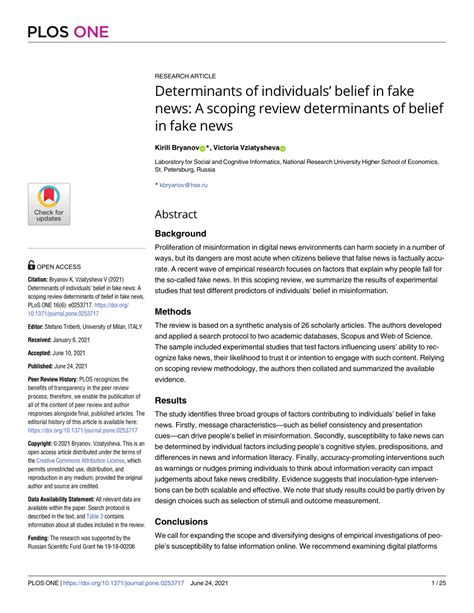people type who are suseptible to fake news ,Determinants of individuals’ belief in fake news: A scoping review ,people type who are suseptible to fake news, Women, while slightly more susceptible to misinformation than men, demonstrated greater accuracy in assessing their own abilities to identify fake news. Men, conversely, . Find the latest selection of Cartier in-store or online at Nordstrom. Shipping is always free and returns are accepted at any location. In-store pickup and alterations services available.

In today's digital age, the spread of misinformation and fake news has become a pressing issue. With the rise of social media and online platforms, it has become easier than ever for false or misleading information to reach a wide audience. Researchers have been studying the factors that make certain individuals more susceptible to fake news, in an effort to better understand and combat this phenomenon.
A recent study conducted by researchers at Cambridge University, known as the Misinformation Susceptibility Test, has shed light on the demographics of people who are most likely to fall for false or misleading headlines. By analyzing the findings of this study, we can identify the characteristics and traits of individuals who are particularly vulnerable to fake news.
Who Falls for Fake News? Study Reveals Surprising Insights
The study conducted by Cambridge University researchers delved into the question of who is most susceptible to false or misleading news. The findings revealed some surprising insights into the demographics and characteristics of individuals who are more likely to fall for fake news.
One of the key demographics identified in the study were individuals who are younger in age. Younger people, particularly those in the millennial and Gen Z generations, were found to be more susceptible to fake news. This may be due to their greater reliance on social media and online platforms for news and information, as well as their tendency to consume news quickly and without thorough vetting.
Another demographic that was found to be vulnerable to fake news were individuals with lower levels of education. Those with lower levels of education may have a harder time discerning between credible and unreliable sources of information, making them more likely to believe false or misleading news.
Additionally, the study also found that individuals who are more politically polarized are more susceptible to fake news. People who strongly identify with a particular political ideology may be more inclined to believe news that aligns with their beliefs, even if it is false or misleading.
New Study Identifies Individuals Most Susceptible to Fake News
Building on the findings of the Cambridge University study, a new study has further identified the characteristics of individuals who are most susceptible to fake news. This study delved deeper into the psychological traits and behaviors that make certain people more vulnerable to misinformation.
One of the key psychological traits identified in the study was cognitive laziness. Individuals who are less inclined to critically evaluate information and instead rely on quick and easy judgments are more likely to believe fake news. This cognitive laziness can lead to individuals accepting information at face value without questioning its accuracy.
Another psychological trait that makes people susceptible to fake news is confirmation bias. Confirmation bias is the tendency to seek out information that confirms one's existing beliefs and to ignore information that contradicts them. This bias can make it easier for individuals to believe news that aligns with their preconceived notions, even if it is false.
The study also found that individuals who are more impulsive and sensation-seeking are more likely to fall for fake news. These individuals may be more drawn to sensationalist headlines and information that elicits strong emotional reactions, making them more susceptible to manipulation by misleading news sources.
What Makes People Especially Vulnerable to Fake News?
Understanding what makes people especially vulnerable to fake news is crucial in addressing the spread of misinformation. By identifying the factors that contribute to individuals' susceptibility to false or misleading information, we can develop strategies to help people better discern between credible and unreliable news sources.
One factor that makes people vulnerable to fake news is their level of media literacy. Individuals who are less media literate may have a harder time evaluating the credibility of news sources and distinguishing between reliable and unreliable information. Improving media literacy through education and awareness campaigns can help empower individuals to better navigate the digital landscape and identify fake news.
Another factor that can make people vulnerable to fake news is their level of trust in news sources. Individuals who have a high level of trust in certain news outlets may be more likely to believe information from those sources, even if it is false. Building trust in diverse and reputable news sources can help combat the spread of fake news and encourage individuals to seek out reliable information.
Additionally, individuals' susceptibility to fake news can also be influenced by their social networks and online communities. People who are surrounded by like-minded individuals and echo chambers may be more exposed to fake news that aligns with their beliefs. Encouraging diverse perspectives and critical thinking within social circles can help reduce the influence of fake news on individuals.
Who is Most Likely to Fall for Fake News?

people type who are suseptible to fake news All Cartier designs are beautifully wrapped in signature Cartier packaging. Gift wrapping is not available for select items including refills and watch straps. Visit your local boutique or contact .
people type who are suseptible to fake news - Determinants of individuals’ belief in fake news: A scoping review